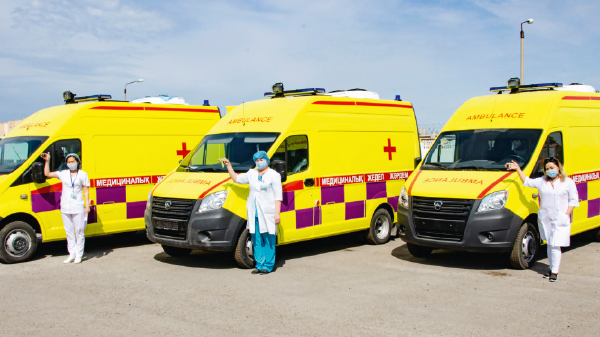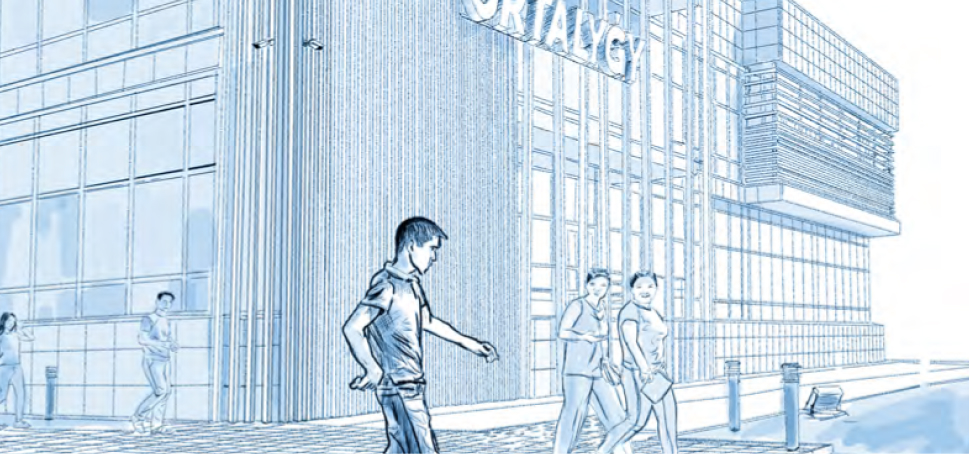
Principle 1 Human Rights: Businesses should support and respect the protection of internationally proclaimed human rights
Principle 2 Human Rights: Businesses should make sure that they are not complicit in human rights abuses
Principle 3 Labour: Businesses should uphold the freedom of association and the effective recognition of the right to collective bargaining
Principle 4 Labour: Businesses should uphold the elimination of all forms of forced and compulsory labour
Principle 5 Labour: Businesses should uphold the effective abolition of child labour
Principle 6 Labour: Businesses should uphold the elimination of discrimination in respect of employment and occupation
EMPLOYMENT
The concept of our personnel policy is aimed at creating conditions for growing value of the human capital at the KMG Group.
Achievement of this strategic goal is based on the three core purposes of the HR-function:
- Establishment of a single HR-function and a single model of personnel management at the KMG Group;
- Continuous improvement and greater openness of the human resources function;
- Development of the corporate culture and improvement of the managers’ skills.
Each objective includes the list of specific tasks that constitute the key areas of the HR policy.
HR MANAGEMENT DEVELOPMENT CONCEPT
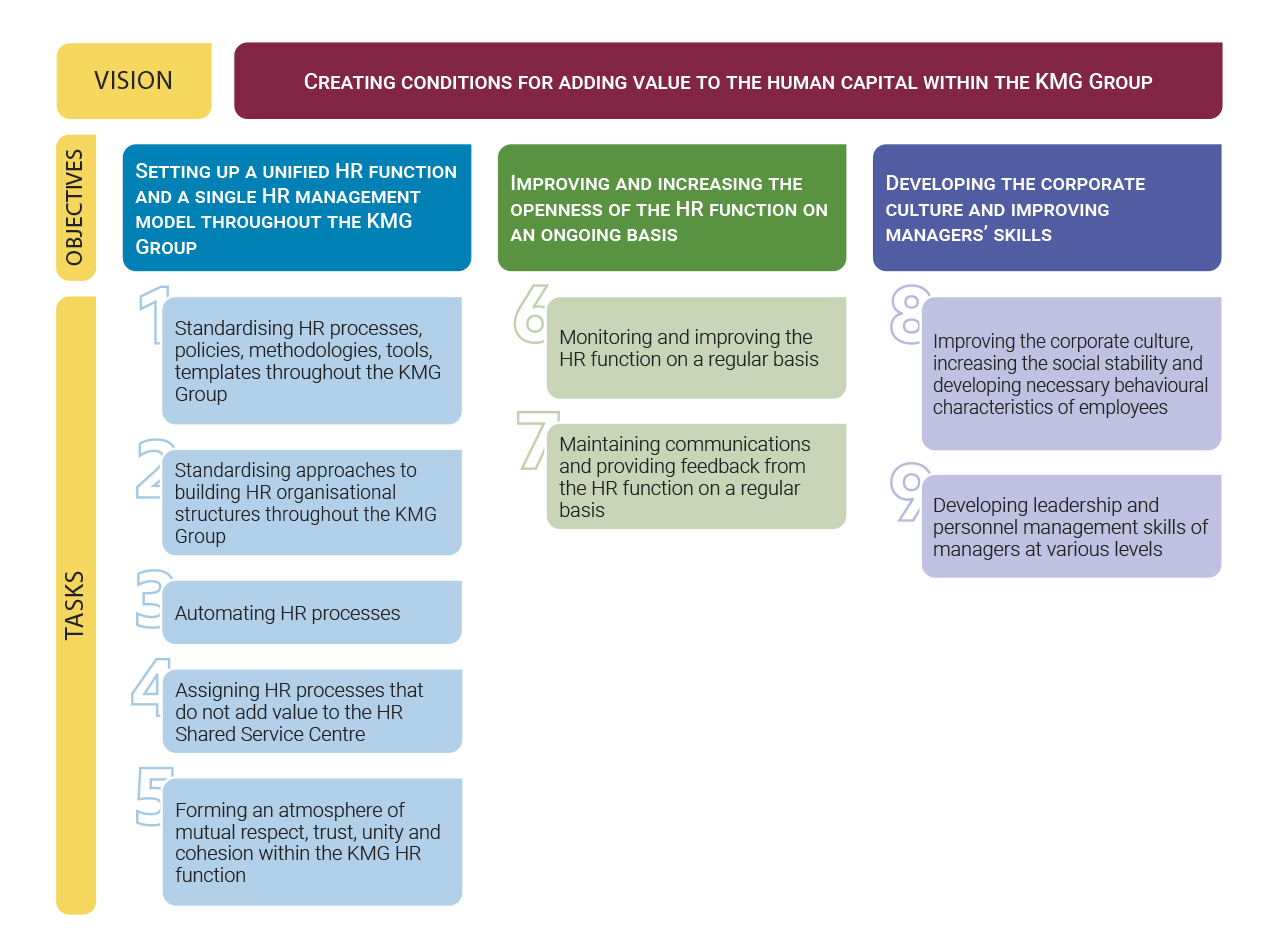
The HR policy concept relies on the following key principles:
- Balance between the interests of employees and the Company;
- Single personnel policy for the entire KMG Group;
- Shifting the administrative supporting role of HR to a strategic one for business;
- Creating added value for business;
- Optimal organisational structure and number of employees;
- Planning the number of personnel based on business needs and labour market conditions;
- Continuous improvement of the training and advanced training programmes;
- Creation of a self-learning organisation based on the 70-20-10 model;
- Managers’ responsibility for human resources management;
- Establishment of a culture of employee engagement in the collective achievement of the strategic goals;
- Creation of conditions for employee motivation;
- Preventing law violations.
Despite the difficulties arisen during the COVID-19 pandemic, KMG prevented suspension of production operations in the regions of operation and could ensure employment of over 60 thous. people in the country.
The actual number of personnel as of the end of 2020 was 57,073 at the KMG Group (2018 – 83,116 people, 2019 – 70,938 people), outstaffing – 3,100 people (2018 – 3,347 people, 2019 – 4,168 people) *.
Considering the fact that the Company’s oeprations are associated with hazardous and harmful labour conditions, the share of male employees is 81 % and 19 % of the personnel are females. At the same time, compared to 2019, the share of females at the KMG Group grew by 1 %.
* In 2018, 2019 the headcount included the perimeter of the KMG Group of Companies, in which the share of KMG was 50 % or more; in 2020, on the recommendation of the Fund, the perimeter was revised and changed to the perimeter of consolidation, i.e. companies in which the share of KMG is more than 50 %. When recalculated in 2018, 2019. along the perimeter of 2020: Actual number in 2018 – 63,178, 2019 – 58,532; outstaffing 2018 – 2,372, 2019 – 3,055.
EMPLOYEES BY CATEGORY FOR THE REPORTING PERIOD, %
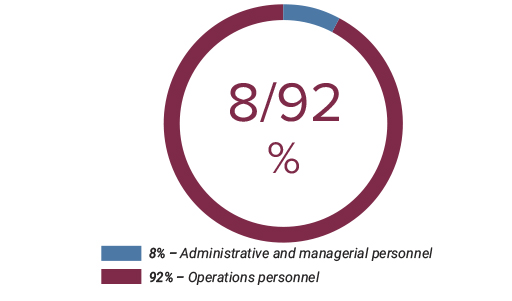
EMPLOYEES BY GENDER FOR THE REPORTING PERIOD, %
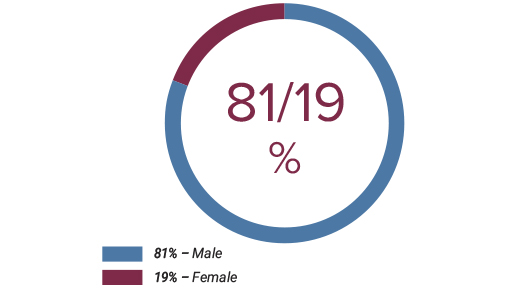
EMPLOYEES IN BREAKDOWN BY SEX IN 2018-2020, %
|
years |
2018 |
2019 |
2020 |
|
male |
81 |
82 |
81 |
|
female |
19 |
18 |
19 |
EMPLOYEES BY GENDER AND CATEGORY FOR THE REPORTING PERIOD, %
|
Categories of employees |
Male |
Female |
Share of employees by category in total staff number, % |
|
Managers |
82 |
18 |
11 |
|
Specialists |
59 |
41 |
24 |
|
Workers |
88 |
12 |
65 |
KMG EMPLOYEES BY AGE IN 2018-2020, %
|
Age |
2018 |
2019 |
2020 |
|
under 31 |
16.7 |
13.5 |
12.4 |
|
31 to 50 |
58.3 |
59.2 |
60.1 |
|
above 50 |
25 |
27.3 |
27.5 |
Share of operating staff in the total headcount is 92 % and administrative and managerial personnel makes 8 % of the headcount.
In 2020, female managers made 18 % of the total number of managers at the KMG Group and female specialists made 41 % of the total number of specialists. The share of female workers was 12 % of the total number of workers. Compared to the previous year, the percentage of female managers and specialists grew by 2 % and the number of female workers increased by 1 %.
In terms of age, the employees from 31 to 50 years old made 60.1 % of the staff number where 80.5 % were males and 19.5 % were females.
Number of employees over 50 years old makes 27.5 % of the total headcount where 81.5 % are males and 18.5 % are females.
The percentage of young employees under 31 is 12.4 % of the total headcount where 82.6 % are males and 17.4 % are females.
EMPLOYEES BY AGE GROUPS FOR THE REPORTING PERIOD, %
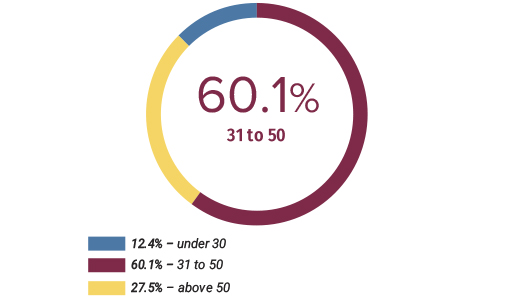
NEWLY HIRED EMPLOYEES BY AGE GROUPS FOR THE REPORTING PERIOD, %
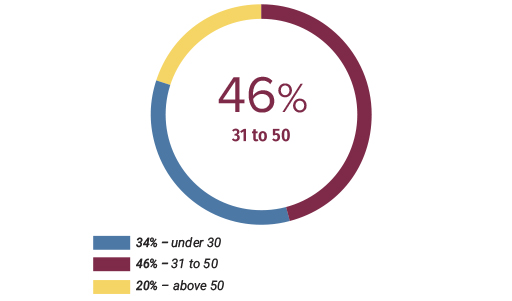
Number of newly employed staff was 5,412 people or 8 % of the average staff number in 2020.
Number of employees who left employment during the reporting period was 3,713* people or 6 % of the average staff number, including employees under 30 – 24% (22% in 2019, 18.2% in 2018, 20.4% in 2017), from 31 to 50 – 48% (49% – 2019, 55% in 2018, 46.4% in 2017), over 50 – 28% (29% in 2019, 27.7% in 2018, 23.5% in 2017).
* difference with Annual Report in 2020 is due to the adjustment of the calculation
NEWLY EMPLOYED STAFF IN 2018–2020 %
|
years |
2018 |
2019 |
2020 |
|
% of hired employees |
12.5 |
7 |
8 |
TURNOVER COEFFICIENT AT THE KMG GROUP*
|
years |
2018 |
2019 |
2020 |
|
Coefficient |
13%** |
7% |
6% |
* Employee turnover coefficient =
А/В*100, where A – number of
employees at own instance, by agreement between the parties, or at
employee’s fault, as if the end of the reporting period; B – average staff
number in the reporting period. Dismissals on their own initiative, by
agreement of the parties, through the fault of the employee (termination
of the employment contract at the initiative of the employer) is carried out
according to the grounds for termination of the employment contract under
the Labor Code
of the Republic of Kazakhstan (More in Appendix 1)
** discrepancy between the data presented in Sustainability report in 2018 and Annual Report in 2020 is explained by the different perimeters of data recording.
NEWLY HIRED EMPLOYEES BY GENDER FOR THE REPORTING PERIOD, %
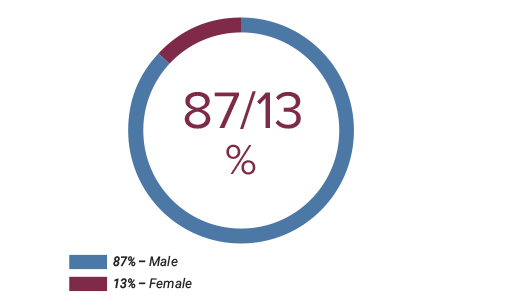
EMPLOYEES WHO LEFT EMPLOYMENT DURING THE REPORTING PERIOD BY AGE CATEGORY,%
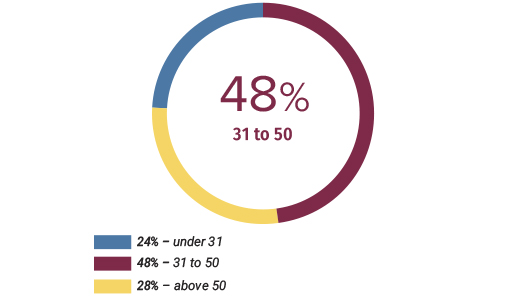
EMPLOYEES WHO LEFT EMPLOYMENT DURING THE REPORTING PERIOD, BY GENDER, %
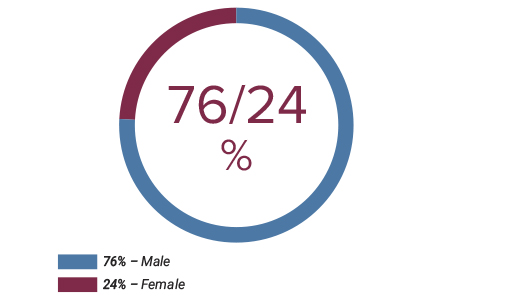
54 % of all employees in the Company underwent a performance assessment in the reporting period (48 % in 2019 and 34 % in 2018). Including females – 20 % and males – 80 %. Employees by category: managers – 15 %, specialists – 32 %, workers – 53 %.
Number of employees on unpaid child-care leave was 1,262 people as of the end of the reporting period, where 96 % were females and 4 % were males.
Number of females on maternity leave was 245 in the reporting period.
EMPLOYEES ON CHILDCARE LEAVE
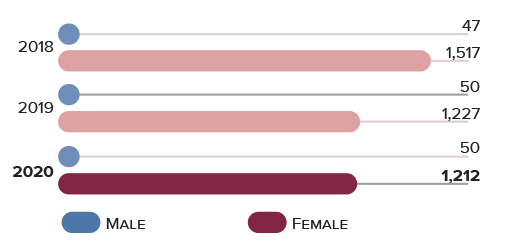
FEMALES ON MATERNITY LEAVE IN 2018-2020
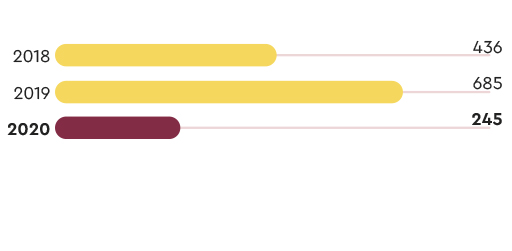
EQUAL OPPORTUNITIES AND MOTIVATION OFPERSONNEL
Our approach to staff motivation is based on the principles of decent remuneration, transparency, and respect for the rights of all employees. All changes in the remuneration system are made with due regard to opinions and suggestions of stakeholders.
There are no differences in basic salary and remuneration system according to gender differences at the KMG Group. Level of remuneration at the KMG Group is associated with a position, not an employee, i.e. both males and females performing the same function receive the same remuneration and other payments set forth in the remuneration regulations of the Company.
The payroll system for the supreme management body and top managers is focused on the performance, incentives, increase in labour productivity and efficiency, and includes the elements of short-term benefits based on the achievement of KPIs. In accordance with the best world practices, the top managers’ performance reflects the economic, environmental and social objectives of the Group.
The Exploration and Production companies implement the Uniform Remuneration System (URS) designed to ensure a uniform remuneration procedure at all business units and enhance the interest of the employees in better performance. The system provides for a range of conditions when employees receive compensatory payments, additional payments and bonuses; one of such criteria is the regional coefficient – a relative increase of remuneration to compensate for additional expenses and higher labour costs associated with working in regions with severe climate. The highest coefficient is applicable to Mangistau and Atyrau Regions.
The entry level remuneration at the Group to the minimal remuneration established by the national law ratio was between 6:1 and 8:1 in 2020 (it was same 6:1 to 8:1 in 2019 and 2018).
The share of local* senior managers** in the regions of operation*** makes 87 % (86 % in 2019 and 85 % in 2018).
* Local – citizens of the Republic of Kazakhstan.
** Senior managers – the First leader and his deputies.
*** Regions of operation – the region (oblast, district) of conducting operational activities.
Employees included in the managerial team corresponds to 11 % of all employees. This includes 18 % females (16.5 % in 2019 and 17 % in 2018) and 82 % males (83.5 % in 2019 and 83 % in 2018). The percentage of females is expected to be higher in the reporting year.
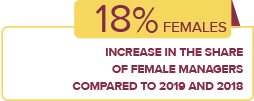
OBSERVANCE OF HUMAN RIGHTS AND SOCIAL ASSISTANCE
The Company strictly complies with the requirements and does not violate the RoK labour law, which states that no one may be subjected to any discrimination in the exercise of his/her labour rights on the grounds of origin, social, official status and material position, gender, race, nationality, language, religious beliefs, convictions, place of residence, age, physical disability or affiliation with public associations. No facts of discrimination were recorded during the reporting period.
We do not use child labour or forced labour, we acknowledge the equal rights of all employees, irrespective of their race, religion and gender.
Each employee of the Company has equal opportunities in exercising his/her labour rights and freedoms. Moreover, the Company is actively engaged in negotiations with employees for signing or amending the collective bargaining agreement, strictly observes the time limits for negotiations and ensures the functioning of appropriate commissions, provides information necessary to conduct negotiations, strictly fulfils the terms and conditions of the collective bargaining agreement.
In accordance with the labour law, any employee has the right to participate through his/her representatives in collective negotiations and drafting of the collective bargaining agreement as well as to review the signed collective bargaining agreement.
The Company has no restrictions concerning the right to freedom of association and collective bargaining based on activity or territory. As a socially responsible company, we fully support this right and create a beneficial environment for the employees the exercise their right to freedom of association.
A standard form of the Collective Agreement has been developed for the purposes of unification. The form specifies the uniform principles of remuneration, social assistance, labour conditions, working and recreation conditions, etc. The standard Collective Agreement specifies the algorithm of collective labour dispute settling should such disputes arise. The standard requirements for development of collective agreements at the KMG Group allow building of labour relations on a on a legislative basis, ensuring that employee benefits are not unreasonably inflated or reduced, and recommending consistent action when labour disputes arise in order to prevent conflicts and relieve tensions.
Collective agreements have been concluded for the KMG Group at 28 production enterprises. In 2020, the number of employees of the KMG Group of Companies covered by collective agreements amounted to 99% or 56,066 people (in 2019, 58,710 people in 29 production enterprises, in 2018 – 58,838 people in 31).
All collective agreements of the KMG companies provides for 35 types of social assistance to the employees and their families, as well as non-working pensioners.
KMG provides its employees with a guaranteed social package including various types of social allowances and compensations:
- financial assistance for health improvement – provided along with paid leave;
- maternity payments;
- monthly payments to the employees on child-care leave until the child is 1.5 years old;
- compensation in case of employment contract termination in case of impossibility of transfer to another job;
- allowance due to total loss of capacity to work and disability;
- single-time payment due to an employee’s death – for arrangement of the funeral;
- single-time payment to the family of an employee who died in the result of an accident at workplace.
The Company also provides social securities for voluntary medical insurance in case of illness and organisation of rest for employees’ children in children’s health camps in Kazakhstan.
Besides, the employees may be provided with additinal social assistance. These forms of social assistance are set forth in collective bargaining agreements or internal regulatory documents of the enterprise. Such payments include payments for the anniversary date, marriage, short-term marriage leave, paid leaves for childbirth, death of relatives, for medical care and surgeries in case the costs exceed the insurance limit, to disabled workers, disabled children, large and low-income families of employees and many other.
In 2020 the KMG Group preserved all social payments and guarantees paid under the collective agreements. At this, it must be noted that children’s recreation was arranged only at five KMG Organisations due to the preventive measures. While the expenses on recreation activities for the employees’ children were 2,917 mln tenge in 2019, in 2020 the amount of such expenses was 199,234 tenge only.

In case of any change in the working conditions, the Company notifies the employee in writing within fifteen calendar days. The minimal notice period for significant changes in the Company’s activities is 4 weeks.
TRADE UNIONS
The Company interacts with trade unions on the social partnership basis as established by the labour law at the industrial and regional levels. At the sector level, the main interaction parameters (social securities, labour organisation issues, remuneration principles, principles of employment, gender, and youth policy, health and safety, prevention and settlement of labour conflicts, etc.) are specified in the Sectoral Agreement for Oil and Gas, Oil Refining, and Petrochemical Sectors of the RoK for 2020–2022 which has been developed with active contribution from the KMG representatives and enterprises.
The KMG Group has 38 trade union committees, including local trade unions, that protect the interests of more than 47 thousand employees (compared to the 2019 data, the number of trade union members reduced due to reorganisation of KMG Security LLP trade union).
At the regional level, regional committees for social partnership operate. Apart from regional employment and occupational health issues, these commissions deal with specific collective labour disputes. All KMG companies have their established and active conciliation commissions.
Social stability
According to the social stability surveys held by the Social Engagement and Communications Centre of JSC Samruk-Kazyna, the integral social stability at the Company was 86 percent in 2020.
Following the survey, Action plans for social stability are being developed and updated at KMG and separate subsidiaries and affiliates in relation to all identified alarming zones.
The KMG social stability action plan covers the problems identified in the organisations’ activities that influence the social well-being of the employees (internal communications, meal quality, conveniences, provision of PPE, training, career development, etc.).
The company also arranged an involvement and satisfaction survey among the administrative and managerial employees of the KMG Corporate Centre which showed the result of 81 % in the reporting period (68 % in 2019).

All production enterprises of KMG have ensured that any employee can contact the management of the enterprise and receive a timely response by employing the internal communication tools. Such internal communication tools assume regular performance assessment meetings between the Chief Executive Officers and the enterprise teams and meetings between the managers and the trade union twice a year.
In 2020, due to the epidemiological situation in the country, the performance assessment meetings with the employees were held online.
The Chief Executive Officers of the subsidiaries and affiliates also receive employees to help resolving personal issues in order to establish and maintain effective direct communication between the employers and the employees at the subsidiaries and affiliates, timely inform the employees of goals and objectives of the subsidiaries and affiliates, inform the employees on the current situation at the organisation, form a positive image of the organisation for the employees, and monitor social and psychological environment in the teams. Each subsidiary and affiliate has a Chief Executive Officer blog and a corporate information website. The companies have also installed displays for video announcements regarding the internal corporate information. Information stands are used to bring prompt announcements and messages to the notice of employees.
The management quarterly meets with the trade unions of the SACs to discuss the most urgent issues related to fulfilment of the collective agreement, the state of workplace discipline, review of appeals from the employees, health and safety issues, social benefits and compensation, and other socially significant issues in the enterprise.
In January 2020, part of the employees of KMGSecurity LLP in the city of Zhanaozen, before the start of the work shift, turned to the shift management of KMG-Security LLP with a proposal to revise the wages for employees. Thanks to the prompt response from the leadership of the Partnership, the proposals of the employees were listened to and appropriate explanatory answers were given, after which the employees began to work.
In 2019–2020, there was a stable social environment among employees of KazMunayGas subsidiaries. This is the result of joint efforts to preserve social stability among employees and improve well-being of population within the KMG geography.
The KMG Group annually holds corporate events such as Spartakiad and Uzdik Maman professional contest. In addition to promoting healthy lifestyle and improving professional skills, such events are tools to consolidate the teams within the KMG Group.
The Company regularly holds festive events and the employees of subsidiaries arrange a concert programme.
For the purposes of preventing spread of coronavirus infection among the employees, no annual corporate events were held in 2020.
STAFF DEVELOPMENT
KMG annually arranged training and development of the personnel, forms new approaches and employee development programmes at the KMG Group.
Due to the COVID-19 pandemic announced by the World Health Organisation in 2020 and all the related circumstances, employee training and development was switched to the remote and online format to the maximum extent possible at KMG.
It should be noted that effective transition to remote work required arrangement of webinars for development of personal and business skills, as well as the skills required to use the applied tools in work.
In 2020, the mandatory trainings in the field of occupational health, safety, and environmental protection legislation for the administrative and managerial personnel were arranged online and training for the business units supervising production facilities was held in a format of webinars and online courses.
Along with that, in 2020 special attention was paid to development of technical competences of the employees of the KMG Corporate Centre, the subsidiaries, and dependent entities of the Group.
Therefore, the programme for development of technical competences “Development Engineer” started in 2019 was completed in 2020. The programme included:
- 6 training modules for 24 managers and chef specialists of the development units;
- development of 5 projects to resolve current issues at the production companies.
The “Chief Geologist” programme was launched in cooperation with KMG engineering to maintain and develop the professional competences and creative potential of the Geology professionals. The participants of the programme were 24 specialists of the geological unit from 24 subsidiaries and affiliates and of the Group. The programme also includes development of projects to address current challenges in this field.
One of the results of active cooperation between KMG and PJSC Tatneft in the field of human resources development is the “Professional Foreman” programme. The training programme is focused on improvement of the knowledge in the field of production and well workover, safety, economics, lean production, as well as the development of personal and business competencies and management skills among the employees of JSC Ozenmunaigas. Besides, considering the current challenges and the importance of digitalisation, the programme includes “Digitalisation and Artificial Intellect” course. The programme engages qualified coaches from Tatneft and KMG Engineering.
Average annual number of academic hours per one employees is 15 hours (17.6 hours in 2019, 15 hours in 2018), including 14.6 hours per male (18 hours in 2019, 14.9 hours in 2018, 15.8 hours in 2017) and 16 per female (15.1 hours in 2019, 15.6 hours in 2018, 18.3 hours in 2017).
AVERAGE ANNUAL NUMBER OF ACADEMIC HOURS PER ONE TRAINED EMPLOYEE BY CATEGORIES, HOURS
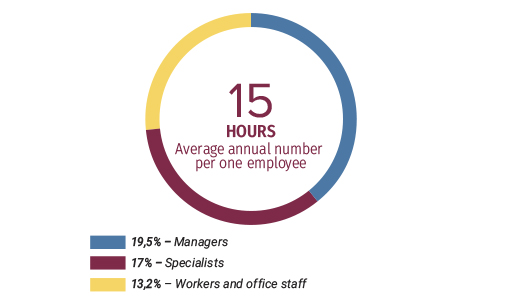
At the same time, it should be noted that employees are trained and developed irrespective of their gender and position taken.
KMG received 27 students from different university of Kazakhstan for industrial work placement and pre-graduation practice who were scheduled for internship in Quarter 1 of 2020. After introduction of the restrictions due to COVID-19, receiving other students was suspended.
When KMG looking for and hiring new employees, the Company strictly observes human rights, avoiding discrimination on gender, nationality and other grounds.
MAIN SUBJECTS OF THE TRAINING AND ADVANCED TRAINING PROGRAMMES FOR EMPLOYEES
- Personal and business training
- HR management
- Internal control and audit
- Environment, HSE, CD and ES
- Procurement
- Economics and finance
- Corporate management. Project management
- Documentation support
- Information technologies
- Language learning
- Mediation and negotiation training programmes
- Operational trainings
- Trade job trainings
- Master’s programs, mini-MBA
- Internship
ZHAS ORKEN PROGRAMME

In the period between 2018 and 2020 the KMG Group was implementing the Zhas Orken programme for young specialist rotation. The mission of Zhas Orken is to facilitate development of the talented youth of Kazakhstan. JSC Samryk-Kazyna, the programme initiator, ensures organisational an financial support to the programme. The purpose of the programme is to train top managers with a perspective of 20-30 years, to develop young professionals by mentoring, and to establish a mentoring institute. Following the fourth rotation of the participants of Zhas Orken 2018, five mentors from the JSC NC “KazMunayGas” were awarded with Zhas Orken badges and gratitude letters. Approximately 15 participants were accepted for internship at the KMG Group under Zhas Orken 2020. Two of Zhas Orken participants were hired upon completion of the programme.
Digital Summer programme was launched in 2018 to develop talents of young people in the field of information technology and digitalisation. The mission of the Digital Summer programme is to engage young specialists in digitalisation projects, develop young professionals by mentoring, and establish a mentoring institute. Young specialists in information technologies may improve the digitalisation/automation processes, improve performance, and enhance competition ability of the organisation in the new digitalisation period. Approximately 10 participants were accepted for summer internship at the KMG Group under Digital Summer programme. Two young specialists were hired upon completion of the internship.
Outplacement
In 2020, the Board of Directors of KMG approved the new structure and the total number of the employees of the KMG central office.
The updated KMG structure has been formed in compliance with the KMG anti-crisis strategy and provided for reduction of the total staff number by 34 % in the KMG central office.
In view of such structural changes, KMG took initiatives to mitigate the impact of the negative factors on the KMG image of a socially responsible employer by implementing the outplacement programme for socially responsible staff release.
The outplacement programme is a system of measures implemented by the employer when dismissing employees to ensure that former employees can be through the crisis period as quickly and as easily as possible and manages to find another job in the nearest future.
As part of the outplacement programme, the HR service held personal talks with each of the released employees.
The main part of the outplacement programme
Stage 1 – work with the personnel – comprises search for new opportunities by means of:
- Webinars with each differentiated group of employees to ensure psychological and emotional recovery;
- Individual sessions with a psychologist – “Strength within us”;
- Individual coach sessions.
Stage 2 – support to the released employees and development of individual career development strategies:
- Analysis of the labour market in Kazakhstan, preparation of a map of the jobs and competences that are currently in-demand (map of professions and current competences);
- Webinars with each differentiated group of employees to provide possibilities and identify risks at the labour market;
- Recruitment support. Registration/uploading of the employees’ CVs on job search websites, recruitments agencies, and/or directly on employer websites.
In 2020, the outplacement project of socially responsible release of employees was implemented as part of the KMG Anti-Crisis Programme. The programme involved 161 released employees. RESULTS: 30 % of the employees found a new job from the moment of the project start; 12 % opened their own business. In total, 93 % of the participants were satisfied with the outplacement programme results.
OUR COMMUNITIES
The subsoil use contractors of the KMG subsidiaries provide for major financing of the regions of operations and social support to the disadvantaged communities. The agreements and memoranda signed with the Akimats of the regions also assume that the KMG subsidiaries and affiliates transfer funds to local executive authorities that distribute the funds in accordance with the local community needs. The KMG Group provided over 4.5 bln tenge for such purposes in 2020, including:
JSC Ozenmunaigas provided 900 mln tenge for development of the social infrastructure in Zhanaozen and Karakiya region.
JSC Embamunaigas provided 129 mln tenge for construction of a school for 424 students in Mukur village of Kyzylkorga district in Atyrau region.
As part of the Agreement with the Akimat of Mangistau region, JSC Mangistaumunaigas provided assistance in countering the epidemic in the amount of 1,980 mln tenge.
MNK “KazMunaiTeniz” LLP financed the social projects in Mangistau region within the Zhemchuzhina PSA in the amount of 51.7 mln tenge.
JV Kazgermunai LLP provided funds for social and economic development of the region and infrastructure in Kyzylorda region in the amount of 338 mln tenge.
Under the Agreement signed with the Akimat of Mangistau region, JSC Karazhanbasmunai transferred 164 mln tenge to social and economic development of the region and infrastructure.
Kazakhturkmunay LLP provided 127 mln tenge, Kazakhoil Aktobe LLP provided 73 mln tenge, and Urikhtau Operating LLP provided 22 mln tenge for social and economic development of Aktobe region and its infrastructure.
Besides, on the basis of the Memorandum signed with the Akimat of Pavlodar region, Pavlodar Refinery LLP ensured support to some sports and sport events in Pavlodar in the amount of 137 mln tenge.
On the basis of the Memorandum of Unidertanding and Cooperation signed with the Akimat of Aktobe region, Kazakhoil Aktobe LLP transferred 100 mln tenge to the Aktobe PARYZ fund.
Also, in fulfilment of the order of the Government of the Republic of Kazakhstan, JSC “KazTransOil” financed the construction of Congress Hall in Turkestan in the amount of 405 mln tenge.
In 2016, the Board of Directors of JSC Samruk-Kazyna approved the Charity Policy of JSC Samruk-Kazyna which requires that KMG and its subsidiaries cannot plan or provide sponsor and charity support independently.
As established in the Charity Policy, any charity projects of JSC Samruk-Kazyna companies are implemented by the fund for development of social projects “Samruk-Kazyna Trust” (hereinafter – the Fund).
The priority areas of the Fund are:
- social and medical support to individuals and communities;
- developing media, cultural community, developing the human potential;
- strengthening labour relations, inter-ethnic relations, investments in sustainable development of the society;
- implementation of the regional programme for social investments in the regions of the Fund’s operations;
- improvement of goodwill and image of the Fund and/or the Fund Group.
In 2020, KMG invested 3.1 bln tenge in charity to finance the projects through the fund.
The Fund implements charity projects and programmes aimed to solution of socially significant problems by the entire JSC Samruk-Kazyna Group. The Fund’s activities are conducted under the auspices of government authorities, the Kazakhstan Government and public and social policy experts. Administrators of the Corporate Fund’s charity projects are selected on bidding basis from among non-governmental organisations. For more details about the Fund’s activities, please follow the link.

OUR CONTRIBUTION TO THE FIGHT AGAINST THE COVID-19 PANDEMIC
In 2020, Company invested in total 6.2 bln tenge in countering COVID-19 pandemic.
These funds were allocated for the purchase of medical equipment, mobile ICUs, oxygen concentrators, and lung ventilators, all of which were urgently needed.
KMG’s subsidiaries also provided vehicles and personal protective equipment to the akimats and healthcare facilities, as well as food baskets to low-income families.

KazTransOil JSC provided sponsorship to medical institutions of Kazakhstan in the purchase of 68 multifunctional mechanical ventilation devices (ALV), including their delivery, installation, training of medical personnel and warranty service in the amount of 1 billion tenge. Ventilators are distributed in accordance with the requests of medical institutions. https://24.kz/ru/news/social/item/418952-68-apparatov-ivl-zakupila-kompaniya-kaztransojl-dlya-kazakhstanskikh-bolnits
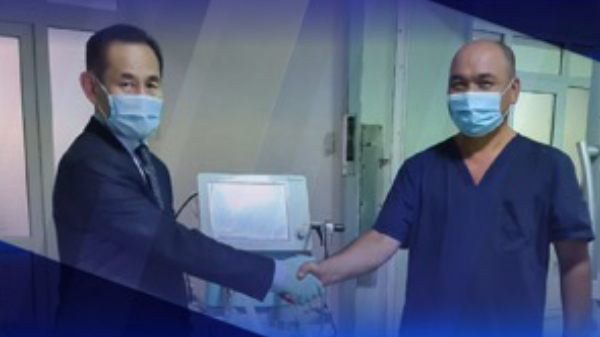
From the first days of the pandemic, JSC "Mangistaumunaigas" in cooperation with local authorities provides all-round support to the population of the region.
Assistance was provided in the acquisition of 3 units ambulance, 20 units of artificial ventilation of the lungs, computed tomography, 15 units UAZ and stationary apparatus for rural medical outpatient clinics. The necessary highly qualified medical care was provided, assistance was provided in providing food for employees of checkpoints, patrol services and medical workers provisional, infectious, observational centers of Mangistau region and in the formation of the stabilization fund treatment provision.
In total, to fight the COVID-19 pandemic, financial assistance allocated over 1.9 billion tenge.
